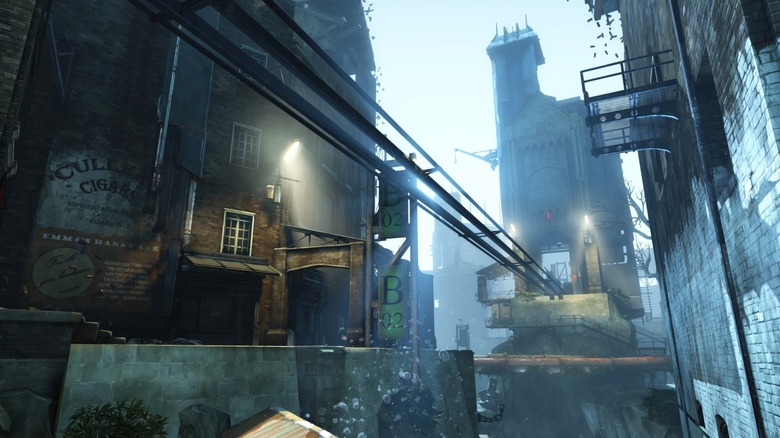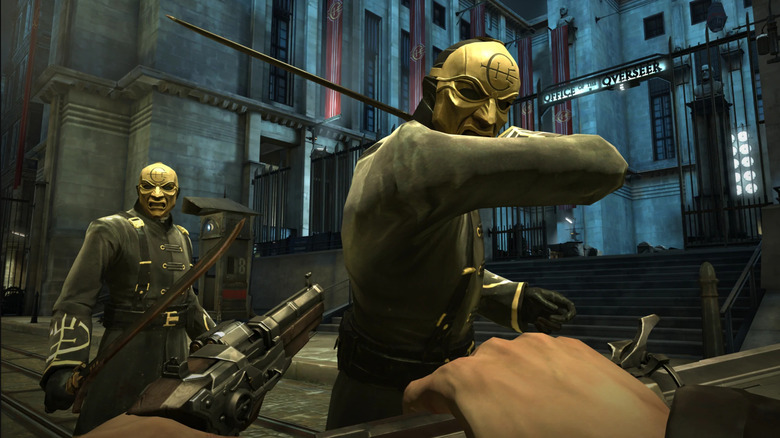Why You Wouldn't Survive Life In Dishonored
Sprawling, dark, and intricate, the world of "Dishonored" offers one of the most immersive settings for a stealth-based action game. There's nothing quite like sneaking through shadowy nooks and crannies, finding bits of storytelling that build the overarching lore of the world and the minutiae of the ordinary people living in it. Falling on the darker spectrum of steampunk— with occult elements of the Lovecraftian sort, to boot— the capital city of Dunwall has a grim but compelling beauty to it that comes alive in the rich details.
Alas, a living setting does not a livable setting make. As fun as it is to explore the game's plague-ravaged streets, the average player would probably enjoy everyday life in Dunwall about as much as actually meeting H.P. Lovecraft himself (a fella with some messed up beliefs). There's the aforementioned plague, for one, that has a 100% mortality rate unless you can afford the very expensive medicine. Which, you probably can't, on account of the complete lack of social mobility: Dunwall borrows its rigidly hierarchical society from 19th century London as well as its aesthetic (per Daily Record) and social issues, complete with vitriolic xenophobia and classism. Good luck getting by if you weren't born into the upper class to begin with; it's all flea-infested beds and grody factory work from here on out.
Here's why you wouldn't survive living in the world of "Dishonored."
It's just like Victorian England, but worse
Life is pretty great in Dunwall — if you're part of the aristocracy. Who doesn't love getting to party all night in clean mansions while the common rabble die off from disease? Never mind that the plague was started by the Royal Spymaster himself in an attempt to eliminate poverty in the city by killing off all the poor folk (which is, in fairness, only slightly more villainous than the slave wage workhouses of 1834). When the disease spread out from the slums and spiraled out of control, the good sir rallied a faction to stage a coup meant to cover his part in the disaster, killing the Empress, declaring himself Regent, and walling off every infected part of the city with impassable steampunk force fields.
Sure, the inhabitants would die off miserably, having to scrounge for food and fight off the neighbors who've turned into aggressive zombies by the final stage of the disease. Without modern amenities like proper water supply and sanitation — as well as navigating so called 'home remedies' and medicine peddled by dubious characters — it wouldn't be easy surviving the quarantine. But what do the people in power care? What was important in this plan is that the status quo would remain untouched.
Welcome to Victorian England, but worse. In real life, London only invested in a new sewerage system after a Cholera scare in Parliament (after 30 years of ongoing crisis for basically everyone else). Dunwall's military tech means those in power never have to worry about the plague leaving the slums.
Magic won't help you, either
Honestly, while it's fun to satirize how little you have to change about pretty much any period of British history to create a perfect dystopian stealth game setting— as marvelously demonstrated by titles like "We Happy Few"— the real kicker about life in "Dishonored" lies in its cosmic mythology. The average citizen of Dunwall doesn't even have fervent Christianity to fall back on for solace; the principal religion here is the Abbey of the Everyman, which teaches that the universe is a chaotic void full of evil and unknowable entities that all hate humanity. No teachings about the immortal soul or the possibility of a heaven if you live a good life, just the promise of "blissful oblivion" if you manage to die without succumbing to evil occult influence.
Utterly bleak, really. The worst part is that this Abbey is half-right: There are supernatural entities that can mark select individuals with powers, but they're honestly rather apathetic; you won't be getting much help from them unless you happen to be the Empress's lover-turned-fugitive on a warpath for revenge. And even then, what use does the average person have for freaky teleportation and the ability to turn into a swarm of rats? If you're looking for an occult way to improve your life, your best bet is to try some dubious rune charms made from whale bones and hope that the afterlife in the Void isn't too terrible.



